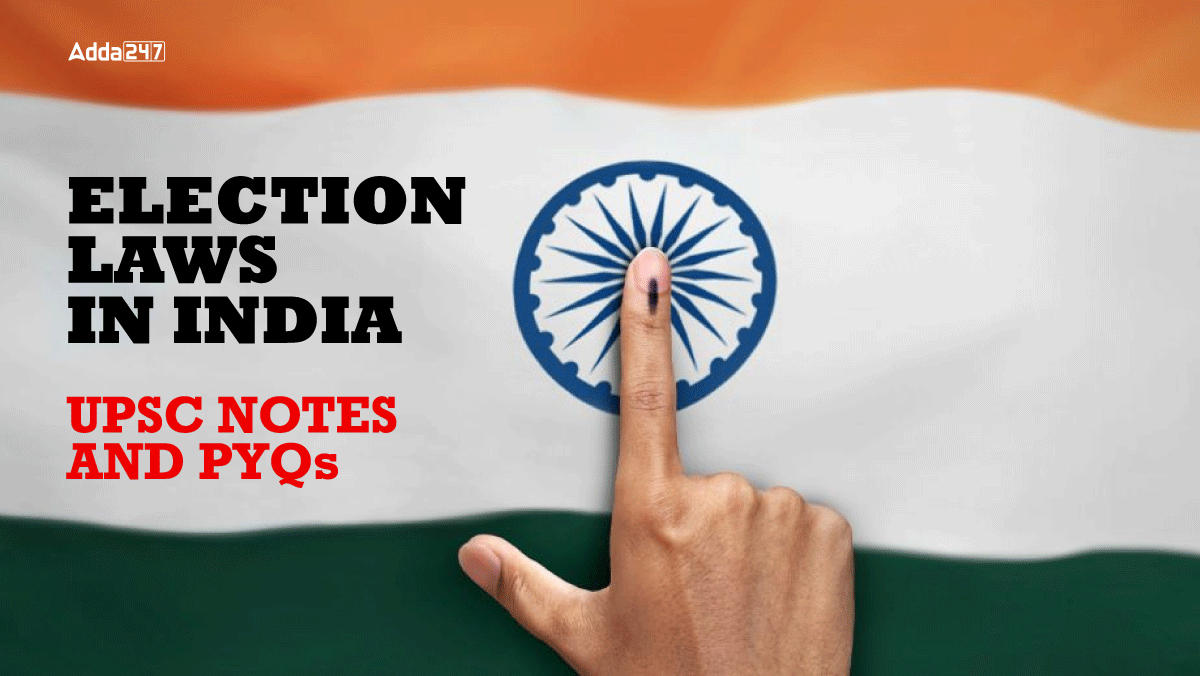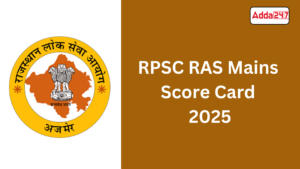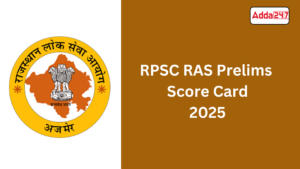Table of Contents
Elections are an integral part of a democracy and are regulated by laws to ensure their free and fair nature. The Constitution of India guarantees free and fair elections, and along with constitutional provisions, Election laws in India by the parliament also provide the same through the Representation of the People Act, 1950, the Representation of the People Act, 1951, and the Delimitation Acts.
Election Laws in India – UPSC Notes
In this article we will be extensively study about the election laws in India which will include the Representation of the People Act, 1950, the Representation of the People Act, 1951, and the Delimitation Acts, Election Laws in India UPSC Notes will help candidates learn about the election laws at glance and prepare for UPSC Prelims and Mains GS2 paper, additional to the UPSC Notes for Election Laws in India we have also mentioned Election Laws in India UPSC PYQs and Notes PDF.
Election Laws
Further in the UPSC Notes for election laws in India you can read about the above mentioned 3 laws i.e. Representation of the People Act, 1950, the Representation of the People Act, 1951, and the Delimitation Acts
Representation of the People Act, 1950
The Representation of the People Act, 1950 provides the framework for allocating seats in the Lok Sabha and State Assemblies, delimiting constituencies, and managing voter registration and electoral rolls in India, read further to understand the constitutional provisions, allocation of seats and purpose of the Representation of People Act, 1950.
What are Constitutional Provisions of Representation of the People Act, 1950 ?
Articles 81 and 170: Define the maximum number of seats in the Parliament and Legislative Assemblies. These articles outline principles for seat allocation in the House of the People (Lok Sabha) and State Legislative Assemblies. The actual allocation of seats is determined by law.
Article 171: Defines for the –
- maximum and minimum number of seats in the Legislative Council of a State.
- Specifies various methods for filling the seats.
What is the Purpose of the Representation of Peoples Act, 1950 ?
The Representation of People Act, 1950 was enacted to provide for:
- Allocation of seats in the House of the People, Legislative Assemblies, and Legislative Councils.
- Allotment of seats in the House of the People to different states, based on the population as of March 1, 1950.
Also the act provides for registration of electors of parliamentary constituencies and for assembly and council constituencies, the qualification and disqualification for the registration is also mentioned in the act
Delimitation of Constituencies
The Act grants the President the power to delimit constituencies for elections and this is done in consultation with the Election Commission of India.
The delimitation is applicable to –
- Lok Sabha
- Legislative Assembly
- Council Assembly
Registration of Electors as per the Representation of People Act, 1950
The act provides for the registration of electors for Parliamentary, Assembly, and Council constituencies, it specifies qualifications and disqualifications for voter registration.
- The act includes special provisions for displaced persons who migrated from Pakistan before July 25, 1949.
Electoral Rolls Provision in the 1950 Act
The act provides provisions for the preparation of electoral rolls, their validity and their revision.
- he 1950 Act permits the registration of persons in electoral rolls who are ordinarily resident in a constituency.
- Additional to this the act permits registration of the following under electoral rolls :
- Army or Police personal or any other government employee who has been posted outside India or State.
- Wives of all these personal are deemed to be ordinarily resident.
How Many Parts and Schedules in the Representation of People Act, 1950 ?
there are total 5 parts and 4 Schedules in Representation of People Act, 1950.
| Parts | Matter |
| I | Preliminary |
| II | Allocation o seats and delimitation |
| IIA | Officers |
| IIB | Electoral Roll for Parliamentary constituencies |
| III | Electoral Roll for Assembly constituencies |
| IV | Electoral Roll for council constituencies |
| IVA | Manner of filling seats in the council of states |
| V | General |
| Schedule | Matter |
| First Schedule | Allocation of Seats in Lok Sabha |
| Second Schedule | Total number of seats in Legislative Assembly |
| Third Schedule | Allocation of seats in legislative council |
| Fourth Schedule | Local authorities for purpose of elections to legislative councils |
| Fifth Schedule | Repealed |
| Sixth Schedule | Repealed |
| Seventh Schedule | Repealed |
Representation of People Act, 1951
The Representation of the People Act, 1951 supplements the 1950 Act by addressing key electoral aspects. It covers the conduct of elections, qualifications and disqualifications for membership in Parliament and State Legislatures.
Representation of people Act, 1951 contains :
This act contains the following :
- Qualification and disqualification of members
- Notification of General Elections
- Registration of political parties
- Administrative machinery for elections
- Conduct of Elections
- Disputes regarding elections
- Supply of certain material to candidates of political parties
- Corrupt practices and electoral offences.
The 1951 act contains XI parts, which deals which the above mentioned matters.
Delimitation Acts
In this section we have discussed about another election law in India which is the Delimitation Act
What are Constitutional Provisions for Delimitation ?
Constitutional Provisions for Delimitation are –
- Articles 82 and 170: Provide for readjustment and division of Parliamentary and Assembly constituencies based on the 2001 census.
- Articles 330 and 332: They provide for re-fixing the number of reserved seats for Scheduled Castes and Scheduled Tribes in Parliament and State Assemblies based on the 2001 census.
The Parliament had passed Delimitation Acts in 1952, 1962, and 1972 and then, after a gap of 30 years, in 2002.
What was the need for the Delimitation Act, 2002 ?
The previous delimitation was based on the 1971 census which lead to an uneven growth in constituency sizes due to population shifts and migration and significant differences in constituency sizes within and between states created imbalances.
What was the purpose of the Delimitation Act, 2002 ?
Purpose of the Delimitation Act, 2002 was to establish a Delimitation Commission to:
- Redraw Parliamentary and Assembly constituencies based on the 2001 census.
- Re-fix the number of reserved seats for Scheduled Castes and Tribes.
- Correct population imbalances without altering the total number of seats based on the 1971 census.
What was the Delimitation Timeline ?
The Delimitation Commission was tasked to complete its work by July 31, 2008.
The new delimitation would apply to all general and by-elections held after the final orders of the Commission were published.
Important Acts relating to election Laws in India
Here we have listed the important acts which relates with the election in India and form the Election Laws in India, read the list below :
- Parliament (Prevention of Disqualification) Act, 1959
- Scheduled Castes and Scheduled Tribes Order (Amendment) Act, 1976
- Government of Union Territories Act, 1963
- Government of National Capital Territory Act, 1991
- Presidential and Vice Presidential Election Act, 1952
What are Important Rules Relating with the Election Laws in India ?
The Following are important rules which relate with the election laws in India
- Registration of electors Rules, 1960s provide for the preparation and publication of electoral Rolls.
- Conduct of Elections Rules, 1961 facilitates conduct of fair and free elections to the Parliament and State Legislatures.
- Prohibition of Simultaneous Membership Rules, 1950.
- Members of Lok Sabha (Disqualification on Ground of Defection) Rules, 1985.
- Members of Rajya Sabha (Disqualification on Ground of Defection) Rules, 1985.
- Presidential and Vice-Presidential Elections Rules, 1974
- Members of Lok Sabha (Declaration of Assets and Liabilities) Rules, 2004.
- Members of Rajya Sabha (Declaration of Assets and Liabilities) Rules, 2004.



 RPSC RAS Mains Score Card 2025 Out, Chec...
RPSC RAS Mains Score Card 2025 Out, Chec...
 UPPSC Cut Off 2024, Expected and Previou...
UPPSC Cut Off 2024, Expected and Previou...
 RPSC RAS Prelims Score Card 2025 Out, Ch...
RPSC RAS Prelims Score Card 2025 Out, Ch...




